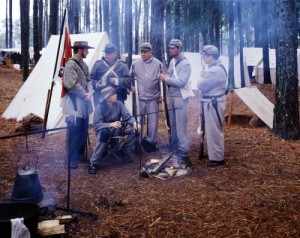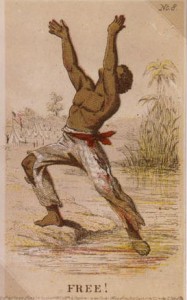The other night I watched actor-director Maximillian Schell’s fascinating 1984 docudrama about Marlene Dietrich, the glamorous (on-screen), reclusive (off it), German-born femme fatale who mesmerized cinema and cabaret audiences but lived her final years cloistered in a Paris apartment.

Known for her “bedroom eyes,” Marlene Dietrich was sometimes mysterious on screen and almost always off it. Although she served in World War II against her native Germany, she had no interest in war or much else that was in the past. (Library of Congress)
A pragmatic woman utterly devoid of romantic reverie despite her public persona, Dietrich told Schell, over and over again, that she was and had always been interested only in the moment. History — including her own tempestuous life to that point — was of little concern to her. Never once, she told Schell, had she pulled out one of her silent or talking pictures and watched it again. So little did she know or care where in Berlin she had spent her early years that she never even inquired when she returned to the ravaged German capital after World War II.
And though she had left Germany, decried Nazism, and even enlisted in the U.S. Army during that war, it held no fascination for her, she said.
As I listened to her — listened because she would let Schell do the interview portion as audio only and would not go on camera — I was struck by the stark contrast between her “fie on the past” outlook and Americans’ quite opposite near-obsession with each and every available detail of another war, its antecedents, and its aftermath.
Dietrich would have scoffed — “rubbish” was her favorite word in the Schell interview — at the rush of new books, trenchant op-ed columns, television documentaries, and blog reflections about the U.S. Civil War.

Fort Sumter was quickly surrendered after Confederate guns pounded the Federal garrison in the opening engagement of the Civil War. (Carol M. Highsmith)
It was triggered, 150 years ago this coming April 12, by the bombardment of a federal fort in Charleston harbor by South Carolina militiamen. But what lit the fuse? What caused six states to declare that they were leaving the Union even before the shelling of Fort Sumter? What force could be so powerful as to lead brothers into war with brothers, with the ultimate loss of 620,000 soldiers in bloody combat?
“Who cares?” I can hear Dietrich’s ghost exclaiming, huskily. But Americans care deeply to this day in this Civil War sesquicentennial year. And many chalk it up to a single, overriding propellant: human slavery, the cruel institution that fueled the southern economy and, for the gentry, its way of life.

Whenever Federal troops prevailed in battle on southern soil, slaves freed from nearby plantations during the Confederate retreat streamed into Union camps. (Library of Congress)
Not northern tariffs. Not states’-rights fervor. Not northern meddling in southerners’ affairs so pervasive that one ordinary Confederate soldier, quoted by Richard T. Hines, a Sons of Confederate Veterans camp commander, remarked to a Yankee as the Reb was being led off to prison: “Why am I fighting? Because you’re here” (emphasis mine).
Slavery is so often cited as the direct and overriding raison d’etre of the Civil War — or at a minimum the common denominator when multiple antecedents are mentioned — that its sores keep flaring.
So raw are sensitivities that the display of the Confederacy’s stars-and-bars battle flag gets some people’s blood boiling. The rebellious nation fought to the death to keep their human chattel, they say. Ergo, its symbols represent evil.

Civil War re-enactments like this one in North Carolina certainly honor the courage of the soldiers on both sides. These “Confederates” gather beside a campfire. (Carol M. Highsmith)
But there is other blood boiling as well. It belongs to those who are just as outraged at efforts to suppress what they firmly believe are reminders of the honorable service of their 260,000 ancestors — many of them poor and barefoot and about as close to being slaveholders as a pig is to a princess — who fought and died on the Confederate side.
The “southern cross” still appears on Mississippi’s state flag and is suggested on Florida’s and Alabama’s. It was not until 2000 that the Confederate flag came down from its perch atop South Carolina’s capitol building in Columbia. Civil-rights groups’ calls for boycotts of South Carolina events and attractions were only slightly muted when state officials lowered the rebel flag but then planted it on the capitol lawn.

Governor McDonnell could not demand the removal of Rebel flags and other symbols from the Confederate White House — officially called the Museum of the Confederacy — in Richmond. It’s owned by a private group, the Confederate Memorial Literary Society. (Carol M. Highsmith)
Last year in Richmond, the final capital of the rebellious Confederate States, Robert McDonnell, the new governor of Virginia revived a storied tradition by declaring April “Confederate History Month.” He said Confederate History Month would promote tourism in a state in which battlefields and Civil War re-enactments are huge historical draws. And the governor’s supporters endorsed McDonnell’s assertion that the special month would help Virginians “understand the sacrifices of the Confederate leaders, soldiers, and citizens during the period of the Civil War.”
But as I told you at the time, when McDonnell never once mentioned that the gruesome war that tore the nation asunder was fought, in part or in whole depending on one’s viewpoint, to preserve or exterminate human bondage in the Confederate states, all hell broke loose.
Former governor Douglas Wilder, an African American, called Governor McDonnell’s omission of the word “slavery” “mind-boggling.”

Emancipation, or the heralded freeing of the slaves by President Abraham Lincoln, actually freed only 200,000 or so slaves in areas of the south then under Union control. Millions more, including some in border and northern states, remained in servitude until the war was won. (Library of Congress)
Governor McDonnell promptly apologized “to any fellow Virginian who has been offended or disappointed.” Slavery was, he said, “an evil and inhumane practice that deprived people of their God-given, inalienable rights, and all Virginians are thankful for its permanent eradication from our borders.”
And that’s not all. McDonnell then ordered two star-and-bar flags removed from the roof of the Confederate Veterans’ Chapel in Richmond, which their descendants had left in trust to the Commonwealth of Virginia.
This ignited the firestorm anew. “Today one group — the one that insists the war was fought over slavery alone — tolerates no disagreement,” Camp Commander Hines wrote in the Washington Post. “Confederate chapels, history months and monuments, they say, should be banished, and the history books rewritten to exclude other points of view.” Anyone who disagrees, Hines continued, “gets called a racist.”
The two flags removed from the Confederate Memorial Chapel “did not trouble the Union soldiers who donated the organ to the chapel,” he asserted.
Others are astonished that some southerners advance every conceivable rationale other than slavery — including a principled fight for states’ rights — for the outbreak of Civil War. The chief “right” that they left the Union hoping to preserve, the critics say, was the right to own slaves. As Civil War historian Edward Ayers pointed out to Washington Post writer Frederick Kunkle, although only 2 percent of northern whites were abolitionists and the conflict “did not begin as a war to end slavery, that is what it became.”

A statue to legendary Confederate general Thomas “Stonewall” Jackson stands at the site of the First Battle of Bull Run. It was there that he got his nickname after fellow southern general Barnard Bee exhorted his troops, “There is Jackson standing like a stone wall. Let us determine to die here, and we will conquer. Rally behind the Virginians!” (Carol M. Highsmith)
Ayers also harks back to the Civil War’s initial, cataclysmic clash in the Virginia countryside just outside Washington, D.C. So confident were the capital’s dandies and their ladies that the engagement — now called the First Battle of Bull Run by most northerners and First Manassas by many southerners — would be a Union rout that they packed picnic lunches and rode out to the countryside to watch.
Instead, the Confederates delivered a thrashing so severe that panicked onlookers chucked their wine and tea sandwiches and ran for their lives. So shocked at the carnage were citizens throughout the North that there were widespread calls for a peace settlement, and good riddance to the South as it went its own way.
Had the war ended there, Ed Ayers points out, there would have been no emancipation of southern slaves, because ending slavery was not yet even a goal of President Abraham Lincoln and his generals. If we think the aftermath of the Civil War — oppressive laws that kept free blacks down, followed by the torment of a long civil-rights struggle — were problematical, one can only imagine what the long-term future might have held for a Confederate States of America among the community of nations.
Instead, we still fight our Civil War, rhetorically, six generations after the bloodshed ended.

University of Richmond President Edward Ayers, who still teaches one history class each year, has a prominent Civil War-anniversary role in a city that’s full of the symbolism from that war, including Monument Avenue, along which stand grand statues of Confederate generals and admirals. (University of Richmond)
Ayers, the son of Tennessee textile workers and the author or editor of 10 books on the South and the Civil War, is a force behind efforts to spur a radical rethinking of the war — or, perhaps better said, a harmonious blending of passionate points of view. Now president of the prestigious, private University of Richmond in a city that is fast becoming a hotbed of Civil War tourism, Ayers believes that it’s possible to both treasure the emancipation of 4 million people kept in servitude and salute the bravery of those on both sides who died fighting the war.
As one of the leaders of “The Future of Richmond’s Past” sesquicentennial commemoration of the Civil War, Ayers says it’s long past time to cease the endless bickering over what might have brought 31 million Americans to each other’s throats in 1861. The shortest way to understand what nearly drove the nation asunder, he told the Post’s Kunkel, “is that it’s a perfect storm” of events, stirred in a cauldron of white-hot emotion.
One last observation on the tenacity with which people cling to such polar certainties about southern slavery, which, it should be noted, did not just sprout in the years leading up to civil war but had been a fixture, North and South, since the early 1600s:

This Henry Louis Stephens lithograph says it all when it comes to the euphoria felt by freed slaves. Often, the feeling didn’t last long, as many slaves were left to fend in a region nominally controlled by occupying Federal troops but occupied by defeated and bitterly hostile southern whites. (Library of Congress)
Many people still equate the South, emotionally, with slavery and attribute any and all devotion to Confederate symbols to racism, thinly veiled if not unadorned.
Likewise, as you learned from the gentleman from the Sons of Confederate Veterans, there is a sizable contingent that casts slavery as an unfortunate but distant historical event having nothing to do with them or their devotion to those who fought and died for their states and rebellious nation.
I do think that Ed Ayers has the right idea: that bringing together people of all ages, races, and outlooks — no matter how hidebound — about the Civil War can lead to universal appreciation of both the bravery of its combatants and the blessed stroke for justice that the emancipation of southern slaves represented.
“The Civil War is at the heart of what this nation is about,” Edward Ayers told the Post. “Freedom, and respect, and possibility for all Americans.”
Ted's Wild Words
These are a few words from this posting that you may not know. Each time, I'll tell you a little about them and also place them into a cumulative archive of "Ted's Wild Words" in the right-hand column of the home page. Just click on it there, and if there's another word that you'd like me to explain, just ask!
Fie. Pronounced “Fy,” this is an exclamation of disgust or disapproval, usually paired with the word “on,” as in “Fie on you!”
Hidebound. Stubbornly narrow-minded. Stuck in one’s ways or attitudes.
Reverie. A pleasant, smile-producing state of dreaminess.
Sesquicentennial. 150th, as in a sesquicentennial celebration or world's fair.


8 responses to “Our Everlasting Civil War”
Slavery’s effect is still being felt today in this country. Millions of blacks are in this country solely because their ancestors were brought here as slaves.
We don’t celebrate the courage of the SS who served as Hitler’s storm troopers, do we? Why celebrate anything of the South? Slavery is an evil which has permanently stained America’s history.
Anyone who ignores the abolitionists, John Brown, the underground railroad, Uncle Tom’s Cabin, the tremendous fight over whether new states were coming into the Union as slave or Free, is either lying or knows nothing.
These other issues are raised by defenders to excuse slavery. They are like children who claim the dog ate their homework.
Your points are thoughtful, heartfelt, and compelling. I wish you had picked a less trivial metaphor, though, then the one about a dog’s eating a child’s homework.
Ted
Sure abolition was good but how far does it have to go in reverse?I refer to such as a president who can not prove birth as required by constitution but can be proven in Kenya which must be state I never knew about if in USA.Also on tv or in movies who is the hero a Negro or the judge or head of dept.I have heard Jews control Hollywood and Wall st also white house and congress is bought off cheaply.Obama the son of a jews appoints his kind to SC.Federal control has usurped states rights.Time to reverse take over not authorized by constitution which as Bush said is just paper.
What about the ultra-rich Karl von Hapsburg’s recent funding for the Dixie separatist movement, and the Alaska and Hawaii independence movements, and the Lakotah independence movement? Who’s keeping the ‘Dixie’ separatist identity alive, and why?
It angers me deeply when others mandate: “This is what it means, or else!” Each of us have our own interpretation and to even suggest that all other opinions be omitted demonstrates the most horrendous prejudice of all.
The Southern leaders, demonstrated by their writings, planned to eliminate slavery after the War Between the States. It was not the time to change the economic engine of the South.
Two very important details seem to continuously be omitted from articles dealing with the war.
1. It was not a civil war. The Confederate States were duly and legally a recognized nation by other countries and had a Constitution and elections. If this war continues to be categorized as a civil war, So must be the Mexican-American War(1846 to 1848) and other similar wars.
2. This conflict of States Rights and Federal Rule started in President Washington’s time and is most noted with the Whiskey Rebellion (1791–1794) and continues even today.
That some good came from such tragedy can be considered a blessing. All-too-often evil acts are done to others when some consider ‘those’ people less than fully human.
For some it is understandable that slavery was the only main issue. For others to say it created an opportunity to have a group of people recognized as fully human is a bonus beyond belief while the serious debate of State’s Rights versus Federal Control continues as a singular issue for more than 200 hundred years.
To Robert,
You give us a lot to think about. Thanks for adding to the discourse.
Ted
Dear Finblake,
Pls. write more about the “Dixie separatist movement.” Haven’t heard about it.
Ted
To ptrmoore,
I approved your comments to show our readers the, to put it mildly, vast spectrum of opinions out there. I detect some strong biases — some would term them prejudices — that reflect the chasms in our country over race and religion that don’t appear to be closing any time soon.
Ted Landphair